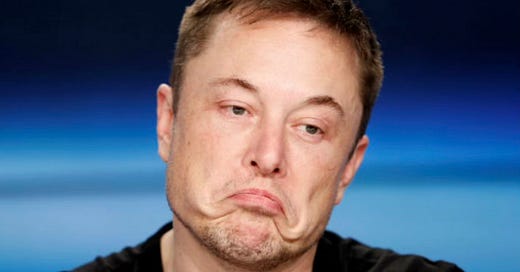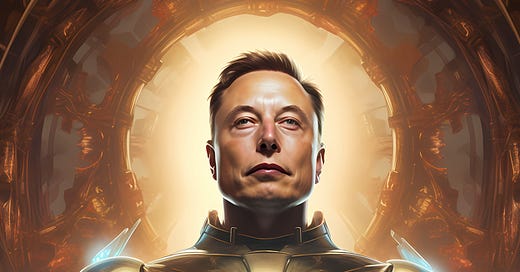
Don't Let the Enemies of Truth Ruin Wikipedia
Elon Musk and other reactionary liars hate the "last good website" because it won't go along with their distortions
Elon Musk is attacking Wikipedia, calling it “Wokepedia” and urging people not to donate “until they restore balance” (by which he means be biased in favor of his views). It’s not the first time he’s denounced the online encyclopedia, and it’s not surprising he and his allies hate it. Wikipedia is a bastion of truth, one they can’t buy or bully, where reality is what the facts are, not whatever some rich reactionaries wish it were. Everyone who prizes finding reliable information on the internet, and values truth more broadly, should defend it.
Wikipedia is the “last good website,” the one online staple that hasn’t gone through the process of “enshittification.” It’s not profit-seeking or publicly traded, so it doesn’t try to monetize the massive number of eyeballs it attracts. It isn’t full of ads, and doesn’t elevate sponsored content. It doesn’t incentivize sensationalism and conflict like algorithmic social media. It isn’t full of slop generated by software the tech industry overhypes as “AI.” It’s the last big website from the early internet that still does the good thing it set out to do; the thing that appealled to so many users and made it part of the wider culture.
By contrast take Google, the crown jewel of internet 1.0. The search engine can still deliver useful information, but it has degraded in pursuit of revenue, placing sponsored links at the top. Old Google, the one that took over the world, used a web crawler that tracked links between websites, and put weight on the search results users chose, surfacing the most relevant and reliable places on the internet in a version of the wisdom of crowds. But now, on top of a pay-to-play element, Google uses its Gemini AI to tell users a sometimes inaccurate answer to their query first. Only after scrolling past the less reliable Gemini answer and some sponsored links can users get to the list of sites they were searching for.
Wikipedia uses a variation on the wisdom of crowds for its ever-growing encyclopedia, with a community of volunteers overseen by administrators. Some people are more knowledgeable, some are more dedicated, and while one or two people may get something wrong, the balance of a knowledgeable, dedicated community will usually get it right. Wikipedia’s community is self-policing, and suspends “vandals” who insert falsehoods or abusive language. When there’s community disagreement prompting back-and-forth edits, or a topic subject to concerted vandalism, administrations restrict who can contribute to it.
Wikipedia isn’t perfect—what is?—and the collective editing process makes the entries on controversial topics, such as Israel-Palestine, more volatile, but it’s a valuable resource. A study published in Nature found the website’s accuracy comparable to Encyclopedia Britannica. Plus it’s much larger, covering things people are interested in that don’t make traditional encyclopedias—coding formulas, plot summaries of TV episodes, you name it—and updating rapidly in response to new developments, like the fall of Syrian dictator Bashar al Assad.
I still tell my students they can’t cite Wikipedia in papers — not primarily because of its overall accuracy, but because the entries are subject to change. If they cite a book or article, and I think it’s wrong, I can check their source. In the rare case a student accurately conveys something from an academic journal, published book, or mainstream media outlet, but the information is flawed, I can see it’s not the student’s fault. But if they got the erroneous information from Wikipedia, it’ll probably be corrected by the time I look.
Still, Wikipedia is a great first cut. For students, researchers, journalists, and anyone curious, it offers usually reliable information on all sorts of topics, including undisputed dates and statistics. It’s easily searchable, and embeds links to related Wikipedia pages for simple navigation. Claims usually have citations, and users—including college students—can follow the link, and if it’s a reliable source, cite that.
Wikipedia co-founder Jimmy Wales has been clear it’s not for sale, and since 2003 the website has been overseen by the nonprofit Wikimedia foundation. The editing process can’t easily be overwhelmed by an online mob of Musk fans, nor bots, and does not facilitate lies spreading faster and farther than any subsequent corrections.
In other words, it’s the opposite of X, which Musk transformed from sometimes reliable, often useful Twitter—where one could find verified experts—into a cesspool of misinformation and propaganda that prioritizes claims from Musk and the users who pay him.
Wikipedia rejects Musk and Friends’ post-truth values—and rebuffed his somewhat trollish offer to buy it for $1 billion—so he’s lying about it. Because he’s not especially creative, he’s lying about one of his go-to bugaboos, DEI (diversity, equity, and inclusion). And because he has no respect for truth as a value, nor for his fans’ intelligence, he’s lying in easily disprovable ways.
Jumping off a post by a large X user called Libs of TikTok—a vile account that exists primarily to direct harassment mobs at LGBT people, and has gotten children’s hospitals shut down for hours by stirring up bomb threats—Musk misleadingly claimed that Wikipedia spends $50 million yearly on DEI. The unsubtle implication, which Musk’s fans quickly got, is that Wikipedia spends nearly 30 percent of its budget on racial sensitivity and sexual harassment seminars.
But Wikipedia regularly publishes its budgets, and most of that $50 million (actually $51.7 million in 2023-24) goes towards improving the encyclopedia. As Enlightenment scholar Morgan Golf-French found, most of the “equity” spending funds Wikipedia contributors in less covered countries and non-Western languages, while the spending marked “safety and inclusion” helps various contributors deal with disinformation, persecution, and complicated or repressive laws. The result is that, for example, an entry on Uganda is written by credentialed experts on Uganda and actual Ugandans, rather than, say, a brigade of racist Elon Musk fans from North America.
Whatever you think of DEI training seminars, that’s not what this is.
I don’t know if Musk knew all this and deliberately lied about it, or didn’t bother looking into it before pushing his false claim, but it doesn’t matter. That’s the thing about the post-truth crowd: they don’t care whether a claim is factual or not, just whether it advances their agenda and placates their feelings. Musk has been going after Wikipedia for a while because its entry for Elon Musk doesn’t go along with his self-promotional myth-making, and other entries prioritize the truth over his preferred distortions.
Fortunately, anyone who values truth is in a position to do something about it. The post-truth attacks on factual reality and reliable information from inside the US government by Musk-allied liar Donald Trump can feel too big for an average citizen to counter—at least until another election—but Wikipedia is a non-profit that relies on volunteers and donations. They’ve handled Musk and Co. so far, but that doesn’t mean they’ll be able to forever, especially if he steps up his efforts.
We’re in a grand information war, whether we want to be or not, and the liars have been winning. Many of the biggest websites and governments have given up on fighting misinformation under pressure, or become purveyors of disinformation themselves. Wikipedia is a fortress that anchors truth’s broader defense, and we must not let it fall.















